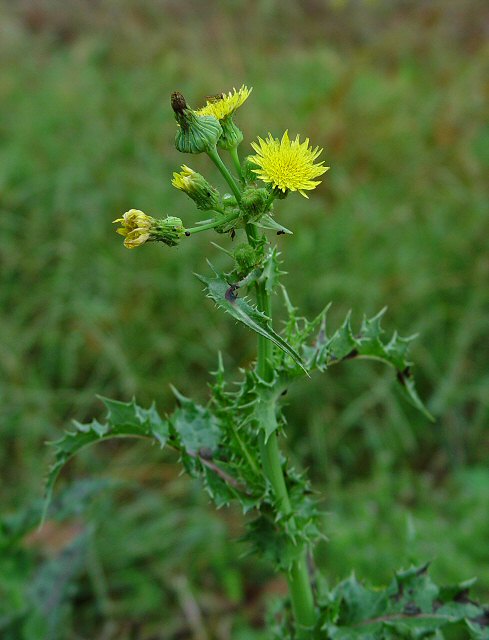Sonchus asper (L.) Hill
Prickly Sow Thistle

Introduced
CC = *
CW = 3
MOC = 45
© DETenaglia
Sonchus asper (L.) HillPrickly Sow Thistle | |
 |
Introduced CC = * CW = 3 MOC = 45 |
© DETenaglia |
|
Family - Asteraceae/Cichorieae Habit - Taprooted annual forb with sticky, milky sap. Stems - Ascending to erect, to 1.5 m, sometimes branched, hollow between the nodes, mostly glabrous, sometimes with sparse, spreading, reddish brown, gland-tipped hairs toward the tip, sometimes somewhat glaucous.
Leaves - Alternate, sessile, clasping, auriculate, the clasping basal lobes rounded, the margins with the teeth having relatively stiff, short, slender prickles at the tips, glabrous, the upper surface darker green and shiny, the undersurface pale and sometimes somewhat glaucous. Basal and lower stem leaves 4-40 cm long, usually irregularly and deeply lobed. Median and upper stem leaves gradually reduced in size, variously unlobed to shallowly lobed, less commonly deeply lobed.
Inflorescences - Terminal irregular panicles, with heads solitary or in loose clusters at branch tips. Branches glabrous or sparsely pubescent with spreading, reddish brown, gland-tipped hairs, occasionally with minute, branched, cobwebby to woolly hairs toward the tip when young. Small bracts sometimes present at branch points.
Heads - Flowering heads ligulate, 1.5-2.7 cm in diameter (measured across the spreading corollas). Involucre cup- or bell-shaped, 9-13 mm long, glabrous or occasionally with minute, branched, cobwebby to woolly hairs toward the base when young. Involucral bracts 1 inner and 3 or 4 outer series, glabrous or pubescent with spreading, gland-tipped hairs, occasionally with minute, branched, cobwebby to woolly hairs toward the base, sometimes darkened or purplish-tinged toward the tip. Receptacle naked, slightly concave in flower.
Flowers - Ligulate florets 80-250 or more per head. Corollas 8-15 mm long, lemon yellow to bright yellow. Disk florets absent. Pappus of numerous apparently smooth bristles 6-9 mm long, these white, often shed irregularly at fruiting.
Fruits - Achenes 2-3 mm long, finely 3-nerved on each face, not crosswrinkled (although the longitudinal nerves may be sparsely and microscopically roughened), yellowish brown to reddish brown.
Flowering - May - October. Habitat - Streambanks, bottomland prairies, pastures, fields, cemeteries, gardens, barnyards, railroads, roadsides, moist disturbed areas. Origin - Native to Europe. Lookalikes - S. oleraceus, S. arvensis. Other info. - This prickly plant occurs throughout the continental U.S., and is probably found statewide in Missouri. It has been grossly undercollected in the state, probably due to being an introduced species which is difficult and potentially painful to voucher, so the exact distribution is not well documented. It is recognized by its disheveled-looking inflorescences, which commonly contain heads in both flowering and fruiting stages, and by the prickly, shiny leaves. The distinctly rounded basal auricles are a signature feature which serve to differentiate this plant from its lookalikes. S. oleraceus usually has pointed basal auricles and is also a less stout species which can be more easily handled without injury. Another lookalike, S. arvensis, has much larger heads. Of these three species, S. asper is probably by far the most common in Missouri. The leaves of this plant are reportedly both palatable and nutritious. Photographs taken at the Kansas City Zoo, 6-11-00, somewhere in North Carolina, 4-20-03, and off Lee Rd 54, Lee County, AL., 10-12-04 (DETenaglia); also at Shaw Nature Reserve, Franklin County, MO, 5-26-2008, along the Katy Trail near Augusta, St. Charles County, MO, 4-28-2012, near Neelyville, Butler County, MO, 5-19-2014, along the Katy Trail near Dutzow, Warren County, MO, 5-22-2020, Riverfront Park, Washington, Franklin County, MO, 5-28-2020, and along the Katy Trail near Marthasville, Warren County, MO, 6-5-2022 (SRTurner). |